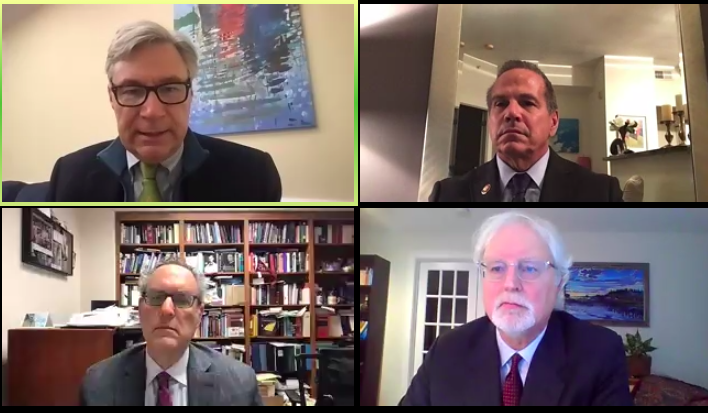Sen. Whitehouse, Rep. Cicilline give RWU community inside look at second Trump impeachment trial
On Feb. 23, RWU Professor of Law David Logan (bottom right) moderated the webinar “Incitement, Insurrection, and Impeachment: Inside the Second Trump Impeachment Trial.” Panelists included Sen. Sheldon Whitehouse (top left), Rep. David Cicilline (top right) and UNC School of Law Professor Michael Gerhardt (bottom left).
For Rhode Island congressional delegates, one impeachment resulted in a variety of important lessons. A historic second impeachment of the same president gave them the opportunity to re-strategize and alter tactics they used the first time around.
U.S. Sen. Sheldon Whitehouse, U.S. Rep. David Cicilline and UNC School of Law Professor Michael Gerhardt shared their learning experiences with students in the Roger Williams University School of Law’s Tuesday night webinar. Co-sponsored by Emory University School of Law and Wake Forest University School of Law, the online program centered on incitement, insurrection and the second Trump impeachment.
Cicilline began drafting articles for the second impeachment on Jan. 6, while the assault on the U.S. Capitol was still ongoing. The following week, Speaker Nancy Pelosi named Cicilline and eight other House impeachment managers to prosecute the trial. Realizing certain language might have worked against them during the first impeachment, the managers chose to focus strictly on the facts, walking through the events that led up to and happened on that day.
“When we presented this case and when we prepared for it, I don’t think there was a single House manager that didn’t break down,” Cicilline said. “The night we saw that introductory video, it was hard to watch. You just couldn’t help but be overwhelmed.”
Sticking to the facts required evidence to try to prove the former President’s guilt. This included video footage, Trump’s own admissions and statements through his social media posts from the days leading up to and the day of the Capitol attack. Cicilline and the other impeachment managers presented all of this to demonstrate why they thought the former President should be charged with inciting insurrection.
“It was important to tell the story to the American people so that they understood what this former President’s culpability was and hopefully history has recorded it,” Cicilline said.
Whitehouse, who voted to convict Trump, said the House managers executed a “carefully done, superb” presentation, praising performances by Cicilline, Rep. Joe Neguse and Rep. Jamie Raskin. The senator also detailed some of the irritations he experienced during the trial, saying the jury was tampered and frustrating to be part of.
“There was almost no way that you were going to get enough Republican senators to vote to convict,” Whitehouse said. “Trump would have had to come in to confess and ask to be convicted I think for that to happen.”
The Senate voted to acquit Trump, falling just 10 votes short of the 2/3 majority necessary for conviction. Despite the acquittal, this trial saw the largest bipartisan vote for impeachment conviction of a U.S. President, with seven Republican senators joining 50 Democratic senators voting for conviction and 43 voting against.
“I very firmly believe that they won their case, with the public and with history, and of course with their consciences,” Whitehouse said. “Indeed, at 57-43, they actually kind of won the case, they just didn’t get the removal and the proper judgment. But 57-43 in almost any other forum is a win.”
One question gaining a lot of attention recently regards the decision to not call on any live witnesses. After presenting witness testimonies and hearing the end of the former President’s case, House managers were prepared not to move forward with additional witnesses. That is until they saw Rep. Jaime Herrera Beutler’s statement about a Jan. 6 conversation between Trump and House Minority Leader Kevin McCarthy, where McCarthy told Trump the mob was made up of his supporters. According to McCarthy, Trump responded, “Well, Kevin, I guess these people are more upset about the election than you are.”
“This was damning evidence that showed the president’s state of mind, his failure to honor his oath by intervening at that point to protect the Congress and the Capitol… so it was really important for us to get it to the American people,” Cicilline said.
After Beutler released her statement, Cicilline was unable to contact her directly, while Republicans argued they should also be able to call another witness. House managers thought they might call on McCarthy, which brings some risk, as they had no idea what he would say. When Republicans agreed they could admit Beutler’s statement as full evidence, Cicilline said they had the benefit of her testimony with no risks. He believes submitting the testimony in the way they did allowed them to get what they needed strategically.
Hearing the defense counsel argue was frustrating for Whitehouse, as he said they presented false propositions and insults. Gerhardt, who served as special counsel to the second impeachment trial’s presiding officer, Sen. Patrick Leahy, also pointed out the defense lawyers’ behavior. He said they went overboard and were actually in violation of a few of the American Bar Association’s Model Rules of Professional Conduct. He referenced Rule 3.3, which regards candor toward the tribunal.
“Many of the things that the lawyers said on the defense side were not truthful or candid. They were misleading and false. The trial may not have been the place to hold them accountable, but there’s a record now of their performance and they’re going to be held accountable not only before BAR associations but before history and as everybody knows, history is very cold blooded in rendering its judgements,” Gerhardt said.
Looking at takeaways from the first impeachment last year and now the second, Gerhardt said grappling with the question of whether or not impeachment still works will be inevitable. The future could potentially bring a change in political framework, but the historical significance of the Jan. 6 attack will remain.
“I think it will hopefully be remembered as a moment that American democracy survived and I think it will also be remembered as a moment that we saw incredible examples of political courage and some of the worst political cowardice of our lifetime,” Cicilline said.







